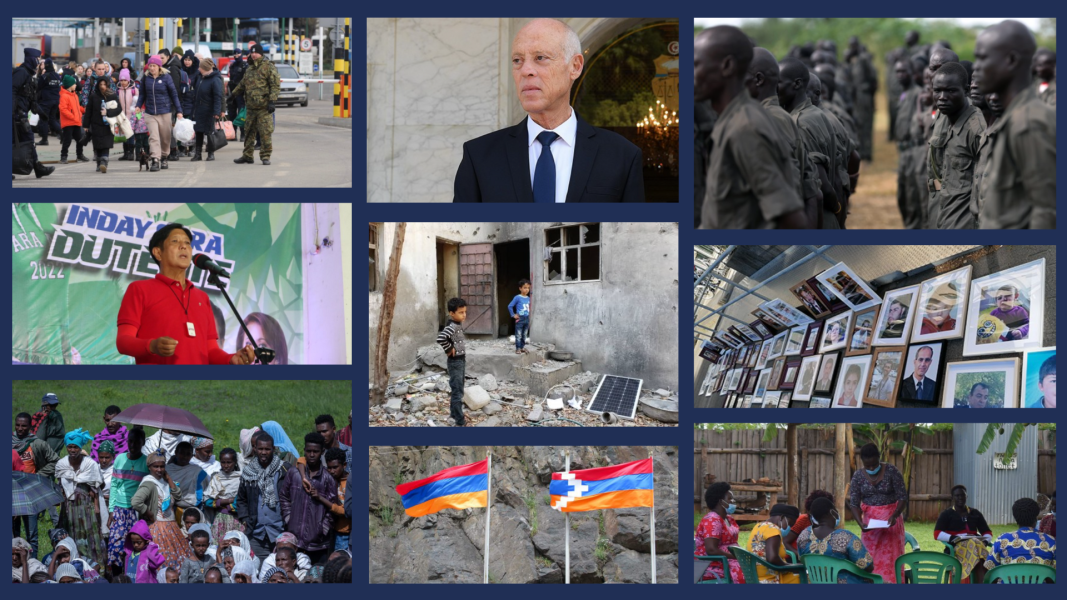Throughout 2022, ICTJ’s experts weighed in on breaking news in more than 10 countries, offering incisive analyses of the political dynamics behind the coverage and the implications for justice, peace, and the rights of victims. In this December edition of the World Report, we look back at the year that was through our Expert’s Choice commentaries, bringing you all of our team’s valuable insights together in one place.
Early in the year, ICTJ’s Head of Program for Syria Nousha Kabawat explained the significance of the conviction of Anwar Raslan, a senior official in the Syrian government, for crimes against humanity by the Higher Regional Court in Koblenz, Germany. The landmark trial, the first ever to prosecute a member of Bashar al-Assad’s regime for such crimes, highlights a crucial component without which Raslan would never have been convicted: the role of victims in achieving justice. Later, our Head of Program for Tunisia Salwa El Gantri assessed the far-reaching consequences of President Kaies Saied’s decision to dissolve the country’s Supreme Judicial Council, which has undermined both judicial independence and democracy in the country.
While the Russian invasion of Ukraine has undeniably threatened global peace and security, in Ukraine, it has devastated the lives of millions of civilians, particularly the thousands of victims of war crimes and other atrocities. ICTJ’s Executive Director Fernando Travesí explored what a “just peace” would mean for victims and ordinary Ukrainians if and when the two sides agree to cease hostilities. Later in year, our Deputy Executive Director and Director of Programs Anna Myriam Roccatello then underscored the need for state actors and members of the international community to focus attention on the immediate needs and aspirations of victims and others directly harmed by the conflict, especially as they ramp up efforts to investigate and prosecute war crimes.
Unfortunately, in 2022, a number of other countries experienced setbacks on their path to justice and democracy. In the Central African Republic, victims of the country’s civil war, who have already waited seven years for the UN-backed Special Criminal Court to begin operations, were forced to wait longer still when the court postponed its first trial just before it began. ICTJ’s Senior Expert Mohamed Suma wrote about the dangers of delaying justice. In the Philippines, 36 years after Ferdinand and Imelda Marcos were overthrown in a “People Power” revolution, the Marcos family returned to office when Ferdinand Marcos Jr. was elected president (and Rodrigo Duterte’s daughter as his vice-president). ICTJ Senior Expert Ruben Carranza warned of the disinformation and historical falsification, largely through social media platforms, that led to this election result, and what the future could look like for Filipinos. In South Sudan, the transitional process remains in a holding pattern, as signatories to the Revitalized Agreement on the Resolution of Conflict in South Sudan moved to extend the peace agreement’s life for another 24 months. ICTJ’s Head of Program for South Sudan Agatha Ndonga commented on how the process has been largely marked by a lack of goodwill, evident by the relevant parties’ persistent failure to meet set deadlines. For now, she concluded, victims in South Sudan will now have to hold on a little longer.
This past year, the ongoing peace processes in Yemen, Armenia, and Ethiopia took various twists and turns. Eight years into a brutal war, the people of Yemen are still suffering through the worst humanitarian crisis on earth. ICTJ’s Head of Program for Lebanon and Yemen Nour El Bejjani Noureddine described the fading hope for peace in the country, as the warring parties failed to reach an agreement to extend the truce before it expired on October 2. Meanwhile, in Armenia, Prime Minister Nikol Pashinyan met with Russian President Vladimir Putin and Azerbaijani President Ilham Aliyev in Sochi to discuss steps to normalize relations between Yerevan and Baku and a longer-term peace deal that would finally end the decades-long, on-and-off conflict over Nagorno-Karabakh. ICTJ Program Coordinator Maria Abrahamyan observed, however, that the two parties seem to want to talk about peace on different terms and without addressing core human rights issues in their respective countries in connection with the conflict. Finally, in November, the Ethiopian federal government and the Tigray People’s Liberation Front signed an African Union-brokered cessation of hostilities agreement. Our Head of Program for Ethiopia and Sudan Ilaria Martorelli wrote that the breakthrough agreement offers a glimmer of hope after two years of brutal war.
In 2022, ICTJ continued to advocate for the rights of victims of sexual and gender-based violence (SGBV), particularly their rights to acknowledgment and repair. In partnership with the Global Survivors Fund, ICTJ undertook research and published reports on the reparative justice needs of SGBV victims in Nepal, The Gambia, and Uganda and the opportunities and obstacles to respond to those needs. ICTJ Senior Expert Virginie Ladisch delved into these recent studies and stressed the importance of treating these victims as agents of change.
Even as we celebrate the beginning of a new year, we at ICTJ never for a moment have stopped monitoring news around the world for the latest in transitional justice. Please make sure you have signed up for our newsletters and be the first to receive our monthly World Report and Expert’s Choice.
